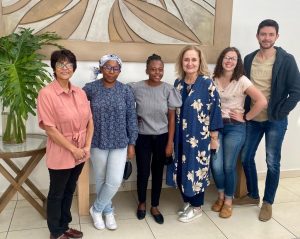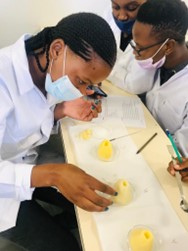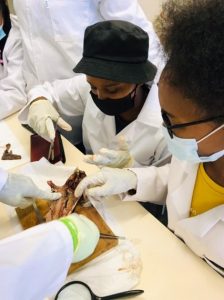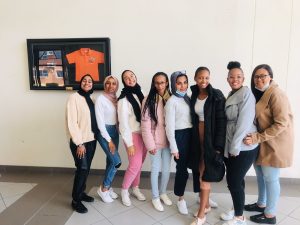Teaching and Learning
TEACHING AND LEARNING IN THE DEPARTMENT OF CHILDHOOD EDUCATION
The DCE is home to several exciting teaching and learning innovations. You can read more about some of the DCE teaching and learning innovations below.
Centre of African Language Teaching – CALT@UJ
The Centre of African Language Teaching (CALT@UJ) was established in semester 2 of 2018. This centre is a first of its kind in South Africa and was established in 2018 through funding from the Department of Higher Education (University Capacity Development Programme; Teaching and Learning Capacity Development Programme). CALT is embedded in the work of the well-established Department of Childhood Education and focuses on two languages – both offered in the Faculty’s BEd in Foundation Phase (FP) Teaching and the BEd in Intermediate Phase (IP) Teaching namely Sesotho and isiZulu. These two languages are also the languages of teaching and learning in the university-affiliated school, the Funda UJabule School (FUJS). The main aim of CALT@UJ is to enable practice-based research and research-based practice in the education and development of teachers who teach African languages in the foundation phase and intermediate phase of schooling and who teach through the medium of African languages in the foundation phase of schooling. A secondary aim is to develop artefacts and materials supporting the development of the two African languages offered at the UJ Soweto campus, namely Sesotho and isiZulu.
Teaching for Learning project
The teaching for learning project involves three foci. The first focus is the development of modules on aspects of “teaching for learning” that will be made available to all teacher education institutions in South Africa, should they wish to use the module in their pre-service teacher education programmes. Some of the modules draw on the body of scholarship dubbed the science of learning. Other aspects addressed in the modules are the development of an entrepreneurial mindset, playful learning and project-based teaching and learning. The second focus of the project is to develop a short learning programme for teachers on teaching for learning, which will be ready to offer in 2023. The third element is a textbook that will be published open-source with the title “Teaching for learning in a fast-changing world”. It will be available in 2023. The project leader is Prof Sarah Gravett, and Prof Sarita Ramsaroop is the co-leader. Other team members are Dr Dean van der Merwe, Lerato Ndabezitha, Semoni Cancelliere (staff members in the Department of Childhood Education) and Elizabeth Mokwena, a master’s student. The project is supported by the E3 Programme and funded by the LEGO Foundation.

DCE staff members involved in the Teaching for Learning project
Innovative practices in the Science and technology modules for the intermediate phase
The DCE hosts one of the best science programmes for the intermediate phase (IP) pre-service teachers, where students are trained to teach science in diverse educational contexts. Students are equipped to teach science as inquiry. With IP science at the DCE first year, students are introduced to mobile virtual reality (VR) and augmented reality (AR) in science learning. Students are also introduced to other virtual laboratories and simulations for science teaching and learning, including PhET simulations and virtual microscopy. A cocktail of teaching strategies is used to engage students, including practical work (virtual and traditional), flipped classrooms, and virtual and augmented reality (VAR)-enhanced learning.



Practical Science learning
Fourth-year practice and reflection sessions
The fourth-year teaching methodology and practicum course requires student teachers to design lessons in a cyclic (iterative) fashion after engaging with the course content. This is similar to the approach used in microteaching lesson study (MLS), which foregrounds lessons’ cyclic, collaborative development. During each design and refinement cycle, the student teachers receive feedback on their lessons from the same teacher educator who facilitates their small-group practice and reflection sessions. During the small-group practice and reflection sessions (which consist of approximately 12 – 15 student teachers), the teacher educators expand on concepts covered in the course content. Student teachers are given the opportunity to discuss their lesson designs with their peers (and the teacher educator) and share ideas. The teacher educators who facilitate the sessions also offer guidance on areas where student teachers could improve their lesson designs. In addition to providing student teachers with the opportunity to reflect on and share their design decisions, the sessions also include a practice component of specific techniques covered in the course.

Fourth-year students at the practice and reflection sessions
